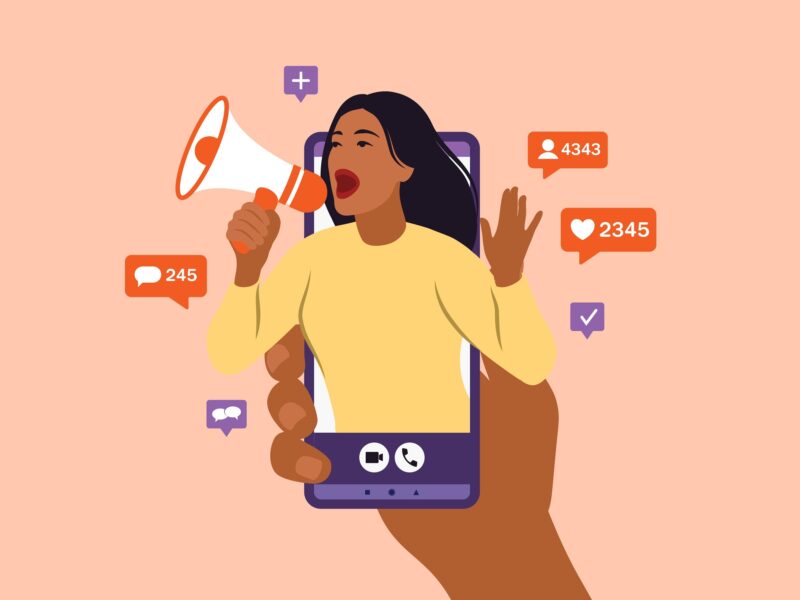Misinformation travels faster than facts. Influencers turn opinions into truth for millions who don’t pause to fact-check. Some lie for clout. Others repeat what they hear. The problem? It’s not harmless. It shapes what you believe, how you vote, who you trust, and what you buy.
On entertainment and celebrity platforms, this issue multiplies. When a popular face says it, people assume it’s credible. It’s not just gossip anymore. It’s power misused. And it’s time to call it out.
Key Highlights
- Celebrity influencers shape opinions without expertise or responsibility
- Misinformation spreads faster through viral content than fact-based reporting
- Beauty, health, and lifestyle niches face the biggest harm due to fake claims
- Many influencers monetize misinformation without facing consequences
- AI content detectors help spot unoriginal or deceptive posts
- You can protect yourself by applying critical thinking, fact-checking, and following credible sources
Fame ≠ Facts

A blue checkmark doesn’t mean the truth. Influence sells. Truth doesn’t. That’s the game. Once someone gains followers, they gain leverage. But with power comes pressure. Pressure to stay relevant, to stay viral, to have an opinion about everything.
So when a skincare influencer suddenly speaks on vaccine safety, or a pop star shares miracle weight-loss pills, people listen. Not because it’s true. Because it’s popular.
Nobody checks for sources when their favorite singer shares a “detox water” recipe that promises to cure bloating overnight. Nobody checks credentials when a fitness influencer warns against a vaccine, calls it poison, and deletes the post before backlash catches up.
In entertainment, credibility isn’t demanded. Popularity is. That’s where misinformation thrives.
The Most Dangerous Arenas
Some categories are hit harder than others. Entertainment sites see this daily.
Health and Wellness
The damage starts here.
- False claims about diet, supplements, skincare, and mental health go viral
- Dangerous trends spread, like dry-scooping pre-workout or DIY fillers
- Influencers promote untested treatments for anxiety or hormonal issues
Most aren’t doctors. But they speak like experts. And fans believe it, no questions asked.
Celebrity Drama and “Insider” Gossip
Fake rumors spread like wildfire.
- Clickbait headlines twist real stories
- Anonymous “insider” tips shape narratives that damage reputations
- Fan pages recycle each other’s posts without vetting any details
One bad source poisons a hundred more. By the time the truth comes out, nobody cares. The damage sticks.
Misinformation Looks Polished Now

Forget typos and grainy memes. Misinformation now wears designer clothes, perfect lighting, and confident language.
You’ll see it in a Reels video with relaxing music. A TikTok explaining how “everyone’s been lied to” about some ingredient. A podcast rant that sounds passionate but lacks any credible reference.
And now? AI makes it worse. You’ll scroll past a well-written caption, and never guess it came from an algorithm, not a person. That’s where tools like Zero GPT matter.
They use DeepAnalyse Technology to detect AI-generated posts by scanning text structure, phrasing, and other hidden patterns. That means you can now verify if what you’re reading is written by a human or an artificial script. It doesn’t fix everything, but it gives you a fighting chance.
How They Profit from the Lies
Follow the money. That’s how you trace the spread.
Brand deals don’t require truth. Just reach. If a false claim gets clicks, sponsors still pay. The influencer gains exposure. The brand sells product.
Even fake drama helps. The more people argue, the more traction the post gets. It doesn’t matter if it’s harmful. It only matters that people are watching.
Some influencers even post “corrective” videos later — not because they regret it, but because the apology video gets even more views.
It’s a game of attention, not accuracy.
What You Can Do About It
Misinformation wins when people stop thinking for themselves. That’s where your power lies. You don’t need to fact-check everything. But you can develop habits that protect you.
Step 1: Pause Before You Share
Ask yourself:
- Does this sound too extreme or too convenient?
- Is the source someone qualified to speak on this topic?
- Does the post reference any studies, experts, or reports?
Emotion drives clicks. But logic protects you.
Step 2: Check the Originals
If the post refers to “new research” or “insider news,” try to find it. Look beyond the caption. See who said it first. You’ll often find that what you’re reading is copied, distorted, or fabricated.
Step 3: Use Tech to Your Advantage
Use tools to check for AI-generated posts, especially when something feels off. It’s built to spot deep-fake style content masked behind clean language.
Also use reverse image searches. If an influencer posts a “personal” photo that looks oddly perfect — chances are it’s stock or AI-generated.
Influencer Red Flags You Should Watch

They’ll never admit they’re spreading misinformation. But patterns speak louder than captions.
Watch for:
- Constant “hot takes” on unrelated topics
- Deleted posts after backlash
- Overuse of phrases like “they don’t want you to know”
- Fake authority — quoting articles they haven’t read
- Ads for miracle products with no listed ingredients or certifications
It’s not about being perfect. It’s about being honest. If someone’s only goal is engagement, not accuracy, they’re not worth your time.
The Role of Entertainment Sites
Celebrity and entertainment platforms hold power too. Many sites chase clicks and recycle viral posts without checks. It’s easy money. But it also keeps the misinformation loop running.
Responsible media should:
- Fact-check viral claims before publishing
- Avoid framing rumors as “reports”
- Separate opinion pieces from factual news
- Call out influencers who mislead
The audience will reward it. People are tired of being fooled. But they need better alternatives.
Final Thoughts: Popular Doesn’t Mean Correct
You don’t need to stop following influencers. But don’t turn off your brain. The most charismatic voice isn’t always the smartest one.
Misinformation feels entertaining. It feels casual. But it quietly changes how people think.
Start asking better questions. Reward creators who take time to get facts right. Use AI detectors to check what’s real. And when in doubt — don’t share it.
Truth needs an audience too. Be that audience.

